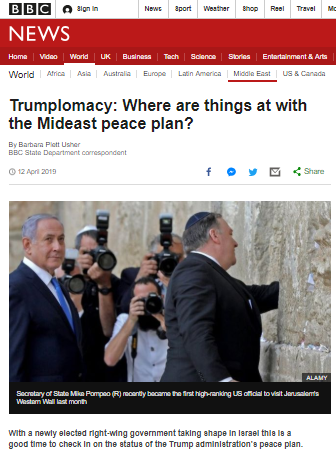In December 2017 the BBC News website published an article titled “Trumplomacy: Key takeaways from Jerusalem policy shift“. In March 2019 the BBC News website published an article titled “Trumplomacy on Golan Heights: What it all means”.
The latest article in the ‘Trumplomacy’ genre by the BBC’s US State Department correspondent Barbara Plett Usher appeared on the BBC News website’s ‘Middle East’ page on April 12th under the headline “Trumplomacy: Where are things at with the Mideast peace plan?”. [emphasis in bold added]
The main image illustrating the article is captioned “Secretary of State Mike Pompeo (R) recently became the first high-ranking US official to visit Jerusalem’s Western Wall last month”. In fact previous American visitors to the site have included the US President, Vice-President and former UN ambassador.
Although Israel’s president will only begin meeting with representatives of the lists which won seats in the Knesset in last week’s election on April 15th in order to hear their recommendations for the candidate who should be tasked with forming the next government and that person will then have 28 days in which to do so (with the possibility of a two-week extension), Plett Usher already ‘knows’ what sort of new government Israel will have:
“With a newly elected right-wing government taking shape in Israel this is a good time to check in on the status of the Trump administration’s peace plan.”
Under the sub-heading “How has the [US] policy changed?” Plett Usher instructs readers to:
“Remember that the formula for peace negotiations has been: two states based on the borders of Arab territory seized by Israel in the 1967 war, with mutually agreed land swaps; sufficient security arrangements; a just solution for Palestinian refugees; and negotiations to settle the fate of Jerusalem, the occupied eastern part of which Palestinians claim as their capital.”
While Plett Usher does not specify the source of her “the formula for peace negotiations”, her description is apparently based on non-binding UN General Assembly resolutions such as 3236 and/or the extinct 2003 Quartet road map.
Interestingly, Plett Usher does not bother to inform her readers that the Oslo Accords – the one agreement which resulted from actual negotiations between Israel and the PLO – did not specify the two-state solution as “the formula”.
Significantly, while portraying the “fate of Jerusalem” as the sole issue to be resolved in negotiations, Plett Usher fails to inform audiences that under the terms of the Oslo Accords, other topics she portrays as ‘givens’ – borders, refugees and settlements – are also to be resolved in permanent status negotiations.
Instead Plett Usher promotes the false notion of pre-1967 “borders”, failing to clarify that those were actually armistice lines which were specifically defined in the 1949 Armistice Agreement as not being borders. Equally revealing is Plett Usher’s description of land assigned by the League of Nations to the creation of a Jewish homeland which was belligerently occupied by Jordan and Egypt in 1948 as “Arab territory” and her prior reference to “the occupied Palestinian West Bank”.
In other words Barbara Plett Usher has unquestioningly adopted and promoted the PLO’s stance on that issue. She goes on:
“But the White House has declared that Jerusalem is the capital of Israel, cut funds to the UN agency that looks after Palestinian refugees, and accepted Israel’s unilateral annexation of other occupied territory, the Golan Heights.”
A journalist with integrity would clarify that the US announcement recognising Jerusalem as Israel’s capital city specifically stated that – in contrast to the impression Plett Usher is trying to create – it had no bearing on negotiations between Israel and the Palestinians.
“Today’s actions—recognizing Jerusalem as Israel’s capital and announcing the relocation of our embassy—do not reflect a departure from the strong commitment of the United States to facilitating a lasting peace agreement. The United States continues to take no position on any final status issues. The specific boundaries of Israeli sovereignty in Jerusalem are subject to final status negotiations between the parties. The United States is not taking a position on boundaries or borders.”
And if bringing up the topic of cuts in US funding to UNRWA, a journalist devoted to informing readers would also have explained the background to that decision, the controversies surrounding that UN agency and the broader issue of Palestinian refugees.
Going on to reference the anti-Israel BDS campaign, Plett Usher likewise fails to inform readers of that campaign’s aims, thereby denying them the ability to judge the statement she paraphrases.
“The state department’s new envoy to combat anti-Semitism, Elan Carr, has reinforced this Israeli narrative in US policy.
He told us that boycotting goods made in Jewish West Bank settlements was anti-Semitic, even though the settlements are illegal under international law and have expanded to such a degree many question whether a Palestinian state is still viable.”
Plett Usher then bolsters her article’s core messaging to readers with a quote sourced from an organisation she once again signposts as “liberal”.
“The administration’s embrace of the Israeli government’s right-wing positions has alarmed liberal American Jewish organizations.
“What they’ve done so far tells you what they intend to lay out,” says Jeremy Ben-Ami of the J Street lobby group. “They have no intention to lay out what could conceivably resolve the conflict. Instead they will tie American government positions to those of the farthest right of Israel’s political spectrum.””
In her final section – sub-headed “What about the Palestinian reaction?” – Plett Usher qualifies the description of people convicted of violent attacks against Israelis.
“Mr Abbas is very unpopular. But on a recent trip to Jerusalem I was told anecdotally that Palestinians have at least given him credit for standing firm on their three core issues: Jerusalem, refugees and maintaining funds to Palestinian prisoners – whom the Israelis regard as terrorists – despite financial pressure.”
Although the US administration’s proposal has yet to be revealed, the Palestinian Authority has already made its rejection of it amply clear. Nevertheless Barbara Plett Usher’s aim in this article is to convince BBC audiences that when it does appear, that plan is destined to fail because it ‘embraces’ the positions of “the farthest right of Israel’s political spectrum” rather than because the Palestinians have made it a non-starter.
While Plett Usher’s promotion of that narrative comes as no surprise, it is unfortunate that BBC audiences continue to be fed commentary which does little to enhance their understanding of this and additional topics from a person whose impartiality on issues relating to Israel has long been in plain sight.
Related Articles:
Palestinian falsehoods on Christianity amplified by BBC’s Plett Usher
Partial portrayals of international law in three BBC reports
BBC News framing of Iranian activity in Syria continues
BBC WS ‘Newshour’ messaging reflects that of anti-Israel group
BBC report that breached impartiality rules still intact online 12 years on
NY Times Errs on Oslo and Two-State Solution (CAMERA)




